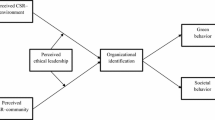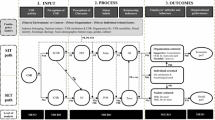Abstract
This paper contributes to growing research exploring employee attitudinal and behavioral reactions to organizational corporate social responsibility initiatives focused on environmental and social responsibility and sustainability. Drawing on social identity theory, we develop and test a moderated-mediation model where employees’ organizational identification mediates the relationship between their perceptions of organizational CSR initiatives and their work engagement and organizational citizenship behaviors, but this relationship is positive only when employees value the role of organizations in supporting environmental and social causes. In a survey of 250 employees from a variety of German organizations, across a range of industry sectors, our hypotheses were fully supported. Theoretical and practical implications are discussed.


Similar content being viewed by others
References
Ashforth, B. E., & Mael, F. (1989). Social identity theory and the organization. Academy of Management Review, 14, 20–39.
Bandura, A. (1969). Social learning of moral judgments. Journal of Personality and Social Psychology, 11, 275–279.
Barnett, M. L. (2007). Stakeholder influence capacity and the variability of financial returns to corporate social responsibility. Academy of Management Review, 32, 794–816.
Berrone, P., Surroca, J., & Tribó, J. A. (2007). Corporate ethical identity as a determinant of firm performance: A test of the mediating role of stakeholder satisfaction. Journal of Business Ethics, 76, 35–53.
Brammer, S., Millington, A., & Rayton, B. (2007). The contribution of corporate social responsibility to organizational commitment. The International Journal of Human Resource Management, 18, 1701–1719.
Bhattacharya, C. B., Sen, S., & Korschun, D. (2008). Using corporate social responsibility to win the war for talent. MIT Sloan Management Review, 49, 37–44.
Branco, M. C., & Rodrigues, L. L. (2006). Corporate social responsibility and resource-based perspectives. Journal of Business Ethics, 69, 111–132.
Brislin, R. W. (1970). Back-translation for cross-cultural research. Journal of Cross-Cultural Psychology, 1, 185–216.
Brown, M. E., Treviño, L. K., & Harrison, D. A. (2005). Ethical leadership: A social learning perspective for construct development and testing. Organizational Behavior and Human Decision Processes, 97, 117–134.
Carroll, A. B. (1999). Corporate social responsibility: Evolution of a definitional construct. Business & Society, 38, 268–295.
Castaldo, S., Perrini, F., Misani, N., & Tencati, A. (2009). The missing link between corporate social responsibility and consumer trust: The case of fair trade products. Journal of Business Ethics, 84, 1–15.
Coldwell, D. A., Billsberry, J., Van Meurs, N., & Marsh, P. J. (2008). The effects of person–organization ethical fit on employee attraction and retention: Towards a testable explanatory model. Journal of Business Ethics, 78, 611–622.
Collier, J., & Esteban, R. (2007). Corporate social responsibility and employee commitment. Business Ethics: A European Review, 16, 19–33.
Colquitt, J. A., Conlon, D. E., Wesson, M. J., Porter, C. O., & Ng, K. Y. (2001). Justice at the millennium: A meta-analytic review of 25 years of organizational justice research. Journal of Applied Psychology, 86, 425–445.
Crawshaw, J. R., Cropanzano, R., Bell, C. M., & Nadisic, T. (2013). Organizational justice: New insights from behavioral ethics. Human Relations, 66, 885–904.
Crawshaw, J. R., van Dick, R., & Boodhoo, Y. (2014). Corporate social responsibility and organizational commitment: The moderating role of individuals’ attitudes to CSR. Politische Psychologie, 3, 38–50.
Cropanzano, R., & Stein, J. H. (2009). Organizational justice and behavioral ethics: Promises and prospects. Business Ethics Quarterly, 19, 193–233.
Deci, E. L., Ryan, R. M., Gagne, M., Leone, D. R., Usunov, J., & Kornazheva, B. P. (2001). Need satisfaction, motivation, and well-being in the work organizations of a former eastern bloc country: A cross-cultural study of self-determination. Personality and Social Psychology Bulletin, 27, 930–942.
De Roeck, K., & Delobbe, N. (2012). Do environmental CSR initiatives serve organizations’ legitimacy in the oil industry? Exploring employees’ reactions through organizational identification theory. Journal of Business Ethics, 110, 397–412.
El-Kassar, A. N., Messarra, L. C., & El-Khalil, R. (2017). CSR, organizational identification, normative commitment, and the moderating effect of the importance of CSR. The Journal of Developing Areas, 51, 409–424.
Etheredge, J. M. (1999). The perceived role of ethics and social responsibility: An alternative scale structure. Journal of Business Ethics, 18, 51–64.
Farooq, O., Rupp, D. E., & Farooq, M. (2017). The multiple pathways through which internal and external corporate social responsibility influence organizational identification and multifoci outcomes: The moderating role of cultural and social orientations. Academy of Management Journal, 60, 954–985.
Fortin, M., Nadisic, T., Bell, C. M., Crawshaw, J. R., & Cropanzano, R. (2016). Beyond the particular and universal: Dependence, independence, and interdependence of context, justice, and ethics. Journal of Business Ethics, 137, 639–647.
Fu, H., Ye, B. H., & Law, R. (2014). You do well and I do well? The behavioral consequences of corporate social responsibility. International Journal of Hospitality Management, 40, 62–70.
Gao, Y., Zhang, D., & Huo, Y. J. (2018). Corporate social responsibility and work engagement: Testing a moderated mediation model. Journal of Business and Psycholology, 33, 661–673.
Garavan, T. N., & McGuire, D. (2010). Human resource development and society: Human resource development’s role in embedding corporate social responsibility, sustainability, and ethics in organizations. Advances in Developing Human Resources, 12, 487–507.
Gerlitz, J. Y., & Schupp, J. (2005). Zur Erhebung der Big-Five-basierten persoenlichkeitsmerkmale im SOEP. DIW Research Notes, 4, 2005.
Glavas, A. (2016). Corporate social responsibility and employee engagement: Enabling employees to employ more of their whole selves at work. Frontiers in Psychology, 7, 796. https://doi.org/10.3389/fpsyg.2016.00796.
Glavas, A., & Piderit, S. K. (2009). How does doing good matter? Effects of corporate citizenship on employees. Journal of Corporate Citizenship, 9, 51–70.
Gond, J. P., El Akremi, A., Swaen, V., & Babu, N. (2017). The psychological microfoundations of corporate social responsibility: A person-centric systematic review. Journal of Organizational Behavior, 38, 225–246.
Hansen, S. D., Dunford, B. B., Boss, A. D., Boss, R. W., & Angermeier, I. (2011). Corporate social responsibility and the benefits of employee trust: A cross-disciplinary perspective. Journal of Business Ethics, 102, 29–45.
Haslam, S. A., Postmes, T., & Ellemers, N. (2003). More than a metaphor: Organizational identity makes organizational life possible. British Journal of Management, 14, 357–369.
Hayes, A. F. (2018). Introduction to mediation, moderation, and conditional process analysis (2nd). New York: Guilford.
Hemingway, C. A. (2005). Personal values as a catalyst for corporate social entrepreneurship. Journal of Business Ethics, 60, 233–249.
Hofstede, G. (1983). National cultures in four dimensions: A research-based theory of cultural differences among nations. International Studies of Management & Organization, 13, 46–74.
Kim, H. R., Lee, M., Lee, H. T., & Kim, N. M. (2010). Corporate social responsibility and employee–company identification. Journal of Business Ethics, 95, 557–569.
Koivisto, S., & Lipponen, J. (2015). A leader’s procedural justice, respect and extra-role behavior: The roles of leader in-group prototypicality and identification. Social Justice Research, 28, 187–206.
Lee, E. S., Park, T. Y., & Koo, B. (2015). Identifying organizational identification as a basis for attitudes and behaviors: A meta-analytic review. Psychological Bulletin, 141, 1049–1080.
Mael, F., & Ashforth, B. E. (1992). Alumni and their alma mater: A partial test of the reformulated model of organizational identification. Journal of Organizational Behavior, 13, 103–123.
Mirvis, P. (2012). Employee engagement and CSR. California Management Review, 54, 93–117.
Mueller, K., Hattrup, K., Spiess, S. O., & Lin-Hi, N. (2012). The effects of corporate social responsibility on employees’ affective commitment: A cross-cultural investigation. Journal of Applied Psychology, 97, 1186–1200.
Peterson, D. K. (2004). The relationship between perceptions of corporate citizenship and organizational commitment. Business & Society, 43(3), 296–319.
Reynolds, S. J. (2006). Moral awareness and ethical predispositions: Investigating the role of individual differences in the recognition of moral issues. Journal of Applied Psychology, 91, 233–243.
Riketta, M. (2005). Organizational identification: A meta-analysis. Journal of Vocational Behavior, 66, 358–384.
Rodrigo, P., & Arenas, D. (2008). Do employees care about CSR programs? A typology of employees according to their attitudes. Journal of Business Ethics, 83, 265–283.
Rupp, D. E. (2011). An employee-centered model of organizational justice and social responsibility. Organizational Psychology Review, 1, 72–94.
Rupp, D. E., Ganapathi, J., Aguilera, R. V., & Williams, C. A. (2006). Employee reactions to corporate social responsibility: An organizational justice framework. Journal of Organizational Behavior, 27, 537–543.
Rupp, D. E., Shao, R., Thornton, M. A., & Skarlicki, D. P. (2013). Applicants’ and employees’ reactions to corporate social responsibility: The moderating effects of first-party justice perceptions and moral identity. Personnel Psychology, 66, 895–933.
Schaufeli, W. B., Bakker, A. B., & Salanova, M. (2006). The measurement of work engagement with a short questionnaire a cross-national study. Educational and Psychological Measurement, 66, 701–716.
Siemsen, E., Roth, A., & Oliveira, P. (2010). Common method bias in regression models with linear, quadratic, and interaction effects. Organizational Research Methods, 13, 456–476.
Tajfel, H., & Turner, J. C. (1979). An integrative theory of intergroup conflict. In W.G. Austin, & S. Worchel (Eds.), The social psychology of intergroup relations (pp. 33–47). Monterey: Brooks/Cole.
Treviño, L. K., Weaver, G. R., & Brown, M. E. (2008). It’s lovely at the top: Hierarchical levels, identities, and perceptions of organizational ethics. Business Ethics Quarterly, 18, 233–252.
Turker, D. (2009a). How corporate social responsibility influences organizational commitment. Journal of Business Ethics, 89, 189–204.
Turker, D. (2009b). Measuring corporate social responsibility: A scale development study. Journal of Business Ethics, 85, 411–427.
Turner, J. C. (1991). Social influence. Milton Keynes: Open University Press.
Turner, J. C., Hogg, M. A., Oakes, P. J., Reicher, S. D., & Wetherell, M. S. (1987). Rediscovering the social group. Oxford: Blackwell.
van Dick, R., Grojean, M. W., Christ, O., & Wieseke, J. (2006). Identity and the extra mile: Relationships between organizational identification and organizational citizenship behavior. British Journal of Management, 17, 283–301.
Williams, L. J., & Anderson, S. E. (1991). Job satisfaction and organizational commitment as predictors of organizational citizenship and in-role behaviors. Journal of Management, 17, 601–617.
Williamson, D., Lynch-Wood, G., & Ramsay, J. (2006). Drivers of environmental behavior in manufacturing SMEs and the implications for CSR. Journal of Business Ethics, 67, 317–330.
Author information
Authors and Affiliations
Corresponding author
Ethics declarations
Conflict of Interest
The authors declare that they have no conflict of interest.
Ethical Approval
All procedures performed in this study were in accordance with the ethical standards of the institutional review board and with the 1964 Helsinki declaration and its later amendments or comparable ethical standards.
Additional information
Publisher’s Note
Springer Nature remains neutral with regard to jurisdictional claims in published maps and institutional affiliations.
Rights and permissions
About this article
Cite this article
van Dick, R., Crawshaw, J.R., Karpf, S. et al. Identity, Importance, and Their Roles in How Corporate Social Responsibility Affects Workplace Attitudes and Behavior. J Bus Psychol 35, 159–169 (2020). https://doi.org/10.1007/s10869-019-09619-w
Published:
Issue Date:
DOI: https://doi.org/10.1007/s10869-019-09619-w




